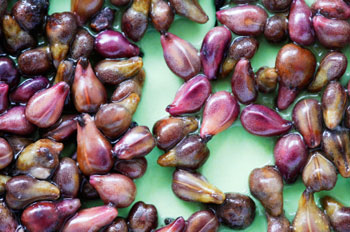New research suggests that a component found in grape seed extract is effective in killing prostate cancer cells. This is according to a study published in the journal Nutrition and Cancer.
Investigators from the University of Colorado Cancer Center have analyzed the potential of grape seed extract (GSE) for its anti-cancer properties over the last 10 years.
But although previous research from the team has demonstrated its effectiveness against cancer cells and how it works, it was unknown as to which element of GSE produces these effects.
“This naturally occurring compound, GSE, is a complex mixture of polyphenols and, so far, it has been unclear about the biologically active constituents of GSE against cancer cells,” says Alpna Tyagi, of the University of Colorado Skaggs School of Pharmacy and Pharmaceutical Sciences.

In the new study, however, the researchers discovered that a component of GSE called B2G2 is the most active against cancer cells.
But they say that isolating the compound from GSE is very costly and takes a long time, which halted any further experiments using this process.
Therefore, they decided to synthesize the B2G2 compound from GSE instead. The study details how the researchers were able to synthesize gram-quantity of the compound much faster than if they were to purify it from GSE, and this method was much more cost-effective.
“We’ve shown similar anti-cancer activity in the past with grape seed extract, but now we know B2G2 is its most biologically active ingredient, which can be synthesized in quantities that will allow us to study the detailed death mechanism in cancer cells,” says Tyagi.
B2G2 successfully triggered cancer cell death
As part of the study, the research team tested the synthesized B2G2 compound on human prostate cancer cells.
The compound was found to induce cancer cell death, known as apoptosis, but left healthy cells unharmed.
The investigators say that their findings mean they are a step closer to understanding the possible effects and mechanisms of active components in GSEs that are effective against cancer cells.
Tyagi adds:
“Isolating and synthesizing B2G2 is an important step because now we have the ability to conduct more experiments with the pure compound.
Ongoing work in the lab further increases our understanding of B2G2′s mechanism of action that will help for the preclinical and clinical studies in the future.”
Other research has also reported positive effects of grape compounds against cancer.
Earlier this year, Medical News today reported on a study suggesting that resveratrol – a compound found in grape skin and red wine – may help treat several cancers, while another study suggested that grape seed extract is effective in the treatment of colorectal cancer.
